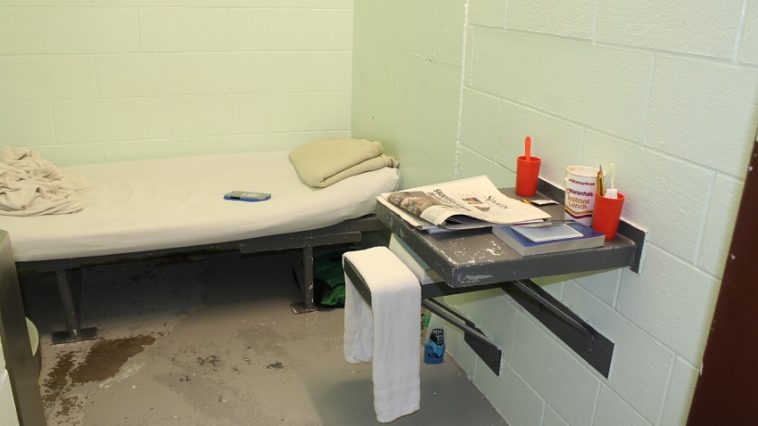Missoula, Montana — In the basement of the Lake County Jail, a grim reality unfolds for individuals accused of crimes, some of whom desperately need mental health care. Instead of receiving the treatment they require, many are subjected to harsh conditions in isolation cells, barely larger than a walk-in closet. For these vulnerable individuals, the jail, rather than being a place of temporary confinement, becomes a long-term holding pen where they wait for psychiatric treatment that is often inaccessible.
The stark conditions of the jail’s isolation cells are apparent as one walks through them. The narrow rooms, some barely big enough for a cot, have worn paths in the cement floors, evidence of inmates’ incessant pacing as they battle mental health crises. The doors are scarred with scratched initials and the haunting phrase “love hurts.” Many prisoners in these cells are not convicted criminals but individuals who have been deemed mentally unfit for trial, awaiting transfer to Montana’s only state-run psychiatric hospital.
Lake County Attorney James Lapotka, who oversees some of these cases, recently took a tour of the facility. As he stood in the small, dimly lit isolation cell, he expressed his own discomfort. “I’m getting anxiety just being in here,” Lapotka remarked, his arms stretching out to touch the walls, which seemed almost within reach.
One such individual, sentenced for stealing a rifle, was held in this isolation cell for 129 days while awaiting a spot at the psychiatric hospital. This delay highlights the overwhelming backlog at the state facility, which is the only option for individuals in need of specialized psychiatric care. The man, as documented in court records, was caught in a limbo, neither convicted nor stable enough for release.
Another inmate, held around the same time, faced nearly five months of waiting in a similar condition. He often experienced psychotic episodes and would request to be placed in the jail’s emergency restraint chair—a steel contraption designed to physically hold inmates when they are a danger to themselves or others. The man, struggling with his mental health, would remain in the chair until his symptoms subsided. Even though the jail had a mental health doctor who visited regularly, the man’s psychotic episodes continued with disturbing frequency.
Joel Shearer, Lake County’s detention commander, recalled how this individual frequently requested the restraint chair during his episodes. “Somebody who’s having a mental health crisis—they don’t belong here,” Shearer said. “We don’t have anywhere else to put them.”
The issue of mental health care in jails and prisons is not unique to Lake County. Across the state of Montana, and in many parts of the country, individuals with mental health issues often end up in the criminal justice system because there are few alternative options for treatment. With jails serving as the default facility for individuals in crisis, the conditions in which they are housed can exacerbate their conditions rather than providing any real therapeutic benefit.
For mental health advocates and legal experts, the current state of affairs in Polson’s jail is a stark reminder of the need for reform. Without access to appropriate mental health facilities, those suffering from psychiatric conditions are left to endure harsh conditions that could cause further harm.
Lapotka, deeply concerned by the lack of resources, noted the inadequacy of the system in dealing with such cases. “We have no place to send people who need psychiatric care,” he said. “And that’s the bottom line—people who are having a mental health crisis need help, not isolation.”
As the demand for mental health services outpaces the available resources, the situation in Polson’s jail serves as a sobering example of a broader crisis that affects countless individuals across the country. The need for systemic change—whether it be more beds in psychiatric hospitals or more mental health professionals in the criminal justice system—is urgent. Without reform, the current system will continue to fail those who need help the most, leaving them to languish in conditions that only worsen their mental health.



